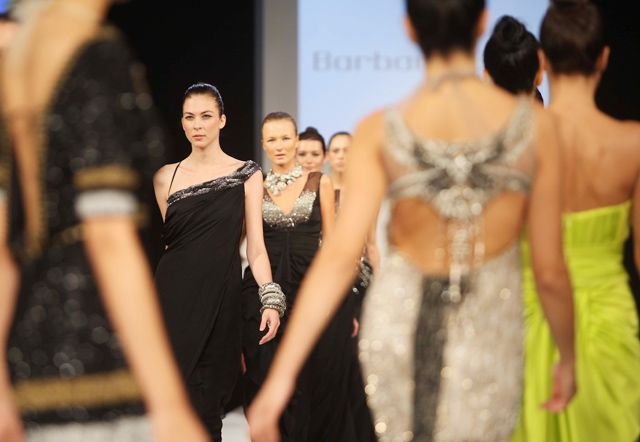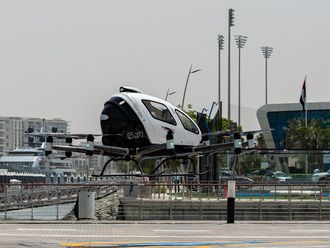Dubai: More than just an extravaganza of creative designs and a parade of skinny models in the latest styles, fashion shows are major business affairs.
Depending on their size and magnitude, fashion shows can generate money not just for designers and organisers, but for fashion houses, retailers and the local economy as well.
The recent London Fashion Week, for instance, was expected to generate sales of more than £100 million (Dh609.09 million) and another £20 million in spending in commercial establishments like restaurants, bars, hotels and even taxis.
Dubai's runway scene may not be on par with those of the established fashion capitals such as London, Paris, Milan or New York, where catwalks can be as crowded as the city streets, but local fashion advocates are pushing to put Dubai on the global fashion map.
Marc Robinson, co-founder and show director of the Dubai Fashion Week (DFW) notes that Dubai has what it takes to play big, given its strong local creative resources and consumers' appetite for high-quality fashion. He says fashion trade events like DFW can also place Dubai more firmly on the international fashion circuits radar, aside from generating more publicity and revenue for the fashion industry.
The Gulf's clothing market is estimated to be worth $12 billion (Dh44.13 billion), while Dubai, home to a sizeable population of wealthy brand-conscious consumers, is built on huge shopping opportunities.
"I don't agree that the local fashion market lags other global markets. A quick look at any mall will show a majority of the world brands being displayed. New brands, usually from the middle range, are being introduced all the time," Jim Meltz, exhibition director of IIR Middle East, says.
Growing market
"Also, as the leasable area in the region continues to grow, many brands are looking to explore this growing market. Dubai also has its own fashion week.
"The entire GCC is not the size of Germany, so we have a smaller [geography] for growth but what many seem to forget is that this region is a hub for distribution. Many of the products are redistributed to other countries. I can confirm that many manufacturers and designers are looking very favourably towards the Middle East for growth. While many countries are reflecting a negative gross domestic product, the Middle East continues to grow and show promise," Meltz adds.
Colin Beaton, managing director of Watt International, agrees that the presence of global brands is a testament that Dubai is indeed on par with major markets in the fashion arena. "With all the large international brands in Dubai, there really is no lag. In fact, with the UAE providing significant sales revenue to some of the luxury brands, Dubai may be at the front of the line for new product launches," he says.
"What Dubai does lack is the small and independent designer or retailer that you would find in London, Paris, New York or Los Angeles. The western expatriate community here just isn't large enough to support small boutique fashion designers," he adds.
In terms of generating brand awareness, however, Beaton believes that celebrities tend to be more effective than fashion shows "which are more focused on buyers and magazine editors who drive more fundamental and longer term change in what is bought and sold in stores".
"Fashion shows are certainly reported in multiple media channels but the focus on celebrity style is far more concentrated, more widely broadcast, and of more interest to consumers. Fashion shows are attended mostly by editors, buyers, reporters, designers and other industry influencers," he notes.
"The result of the fashion shows is a lot magazine exposure and purchases by retailers or buyers that are often six to nine months in advance of the season. Haute couture is of very little relevance to the majority of consumers; the price and practicality limit the demand to the very rich or obsessive fashionista," he adds.













